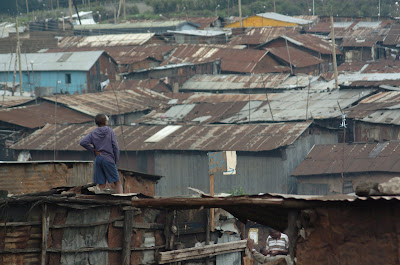
We’re on a quest to figure out the economics of slum life this week, so if you hate numbers, I apologize.
We spent time with Felix today. He’s 16 and lives with his sister Winnie, who I wrote about a few days ago. She’s the one who fetches water and pays an exorbitant fee.
Felix does his own bit to help the family survive down in Mathare Valley and this is how it goes.
We followed Felix out of the slum at 5:30 a.m. to the Gikombo Market to buy maize. It was raining so the normally fetid slum was abnormally fetid. It was downright gross. We slithered down to the Mathare River, crossed the bridge and scrambled up the other side to reach the main road so Felix could catch a Matatu (public transport) to go the 5km to market.
The Matatu Operators Association had threatened a general strike for three days, starting today, and they were true their word.
Nairobi is a city of over 3 million people. Locals tell me that maybe 5% of those have private vehicles. The rest use public transportation. The strike—called because of alleged police corruption (matatu drivers are tired of paying bribes, they say)—has a direct and immediate impact on the poor.
Take Felix for example. It’s raining. It’s very muddy. And this 16-year-old kid needs to make some money today so he and his siblings can eat. The strike means he now has to walk 5km to market, do his business there, then lug a heavy sack of maize the 5km back to the slum.
We filmed Felix and tens of thousands of others as they walked into town. It was like a river of humanity as people scrambled to get into work so they wouldn’t lose their jobs. We took Felix the rest of the way and watched as he went down a dirty side street to purchase a sack of maize for resell. When he was done, he waded out of the mud and began the hike back to Mathare Valley. We took him most of the way and were once again amazed at the flow of humanity out of Mathare, into Nairobi proper.
Felix took his maize back to his shack and boiled the corn in the husks for several hours. When it was ready, he hawked the maize in the slum for awhile before settling down on a corner somewhere to let people come to him to purchase maize. It took him almost the entire day and when it was all done—assuming he sold it all—he would make a profit of 105/=, or, $1.40.
Here are the numbers:
40/= Matatu Fare to buy the maize
50/= Charcoal to boil the maize
05/= Water to boil the maize
400/= Purchase of the maize
Felix purchases three ears of corn for 20/= and then sells the boiled ears for 10/= each. If he sells his 400/= of maize, he makes a total of 600/=. Remove expenses and Felix is left with 105/= ($1.40). Today he did well because he did not have to pay Matatu fare as we took him with us. In the afternoon, when it was really hot and we all needed a break, we stopped for sodas. I paid the 30/= for each soda (about .50 cents) and later, when I was doing the numbers, realized that the soda I bought for Felix would have been almost a third of his daily profit.
This is not a lazy kid. Felix works hard to make it, but no matter how hard he works, the economics just don’t add up. He says he wants to be an engineer and see “London and America.” Selling maize on the slopes of Mathare Valley is not the path that will take him there.
 ining, Muslim outreach and so much more.
ining, Muslim outreach and so much more. major needs great places to send interns. The more we talked, the more excited we all got about summer interns from Dordt living and working in Nairobi, and even pursuing a semester abroad—working with OFM.
major needs great places to send interns. The more we talked, the more excited we all got about summer interns from Dordt living and working in Nairobi, and even pursuing a semester abroad—working with OFM.










